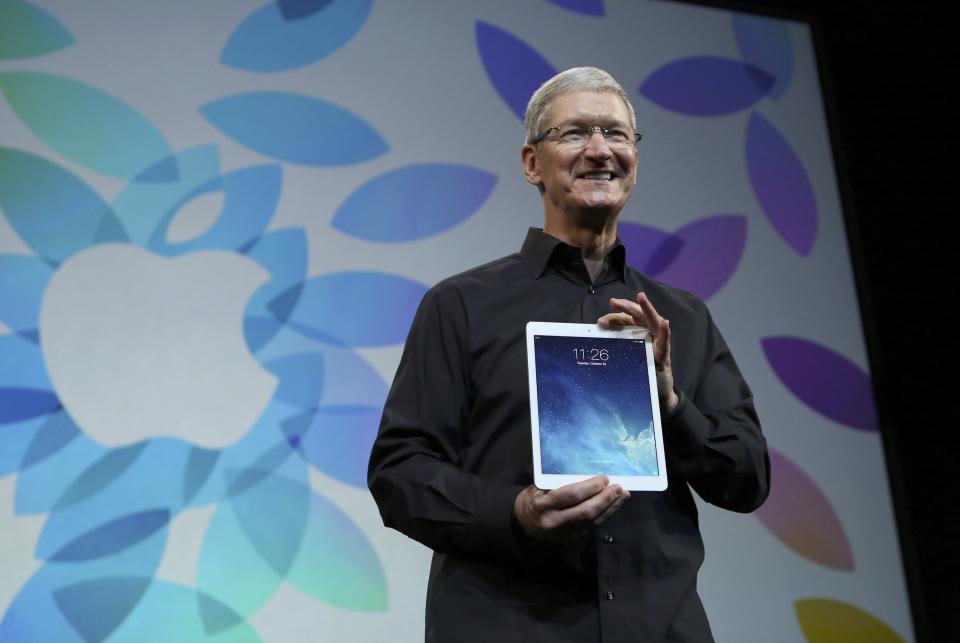iPad Air’s Android problem

It’s a familiar story: Apple introduces a new product into a previously underserved market. Apple dominates the category for a couple of years. Then along comes Google and steals Apple’s lunch.
As Apple’s iPad franchise experiences the same slow market share ebb that’s already sapped the iPhone’s once-segment-leading mojo, it’s tempting to ask whether the company’s fifth generation iPad – now called the iPad Air – and iPad mini with Retina Display, announced in San Francisco on Tuesday and on sale by month’s end, are enough to stave off Android’s continued encroachment into a category that as recently as last year saw nearly two out of three tablets sold carrying Apple logos.
A market share fall from grace
That’s all changing. Quickly. IDC data now shows Apple’s iPads accounting for 32.5 per cent of all tablets sold in the second quarter of this year, down from 60 per cent in the year-ago quarter. Android’s global market share jumped to 62.6 per cent, up 163 per cent year-over-year. Strategy Analytics figures for the same quarter paint an even gloomier picture, with Android-based tablets taking 67 per cent compared to the iPad’s 28 per cent.
Today’s announcements won’t reverse the downward market share trend. As much as the world wants better, faster iPads with higher-resolution screens, lighter bodies and faster chips inside, Apple has failed to move the needle far enough to shut the door on hard-charging competition in the hotter-than-hot tablet market. It’s stubborn adherence to existing price points is another sticking point as competitive 7-inch-class Android devices in the $200 range further siphon off units at the lower end. Selling the previous-generation iPad mini for $30 less is nowhere near enough.
No one is saying Apple is about to hungry, of course. Counterpoint Research estimates global tablet shipments will rise 28 per cent in 2014, and a rising tide raises all boats. But Apple’s days of having the tablet market virtually to itself are over.
First smartphones, now tablets
The shifting tablet market trend is identical to the one that played out in smartphones. Early Android-powered smartphones were chunky, less functional substitutes to the iPhone. But as Google smoothed out the software and its hardware partners like Samsung, LG, HTC and, more recently, the now-captive Motorola began releasing sleek, desirable designs, Android phones quickly began eating into the iPhone’s dominance and now account for 80 per cent of smartphone sales.
As Google and its partners refine their larger-screen alternatives, they benefit from a number of market advantages. They can largely bypass the carriers because the majority of tablets sold don’t include 3G or 4G radios. The baseline operating system is significantly more mature than it was three or four years ago, and Android smartphone-carrying consumers are already used to Google’s mobile offering. The ecosystem is also significantly more evolved. While it still lags somewhat in tablet-specific apps, the balance is shifting rapidly as the software matures and as developers warm to Google’s less restrictive approval and monetization policies. Thanks to growing developer support, the Google Play online store now rivals Apple’s iTunes App Store in both quantity and quality of titles and content.
The first generation of ultra-cheap Android-powered tablets that offered plasticky hardware, obsolete operating systems and little else have now been replaced with competitive devices that, feature-for-feature, more than hold their own in an increasingly competitive market. Buying an Android tablet no longer means dealing with cheapened hardware or a compromised end-user experience.
Apple’s iPad Air and iPad mini with Retina Screen may indeed be the greatest iPads even released. But they may not be great enough to staunch further erosion of the brand.
Carmi Levy is a London, Ont.-based independent technology analyst and journalist. The opinions expressed are his own. carmilevy@yahoo.ca

 Yahoo Finance
Yahoo Finance 